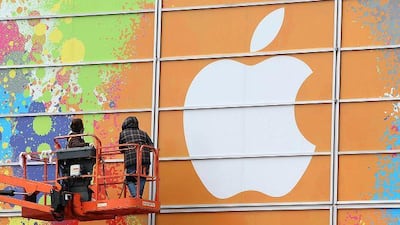Remember those final days of the dotcom bubble, when a start-up company that shipped dog food across the US was considered the future of "e-tailing" and Wall Street's cleverest analysts were certain Cisco Systems would become the world's first US$1 trillion (Dh3.67tn) company?
Well, if you have taken a look at Apple's stock price recently, you could be forgiven for thinking that somehow the clocks have been running backwards and we are back in the era when Henry Blodget was king and AOL had enough funny money to buy Time Warner for twice the GDP of Qatar. In little more than a year, Apple's stock has tripled in value from $88.33 on January 16 last year to its closing price on Friday of $270.83. Last week alone it rose 10 per cent.
Predicting a $300 stock price for Apple used to be a bold statement. Now, with Apple worth almost as much as its old enemy Microsoft, $350 seems within reach. But is there any justification for this Apple mania, or has Wall Street simply developed a crush for the company and its seductive range of i-prefaced products; a crush that will inevitably lead to heart-break and recriminations? There certainly was not a great deal of enthusiasm for the company's long-term prospects back in the winter of 2008 to 2009. After all, here was a business model that depended entirely on selling limited-function, proprietary technology to consumers for two or three times the price of generic (and sometimes more useful) alternatives.
On top of that was the issue of Steve Jobs, the enigmatic, polo neck-wearing chief architect of Apple, who had been forced to take a six-month leave of absence for a liver transplant without an obvious successor in place. Even given the phenomenal success of Apple's iPhone, it looked for a while as though the company's decade of innovation, profitability and stock market gains may have finally come to an end.
It hadn't, of course, as has been so obviously demonstrated by the company's second-quarter results, which blew a hole in analysts' expectations. Sales of the iPhone were 1.5 million ahead of most predictions (at 8.7 million), with iPod sales 800,000 higher than analysts' guesses (at 10.9 million), and Mac sales more or less exactly as hoped (at 2.9 million). "It's hard to say what did better than expected," one US analyst said. "It all did better than expected."
Although Mr Jobs has returned to Apple, the most reassuring part about these recession-defying results is perhaps how well the company seems to have done while its leader was away. The prospect of a viable "post-Steve" Apple has removed one of the last big concerns held by investors over the past few years. Also heartening, of course, is the clear evidence that the company's beautifully executed product integration strategy - from MobileMe to iTunes to the iPod, iMac, iPhone and now the iPad - is finally beginning to pay off, as consumers gradually replace every link in the chain of their personal computing-communications networks with Apple devices.
After all, a phone user who buys and likes an iPhone will more likely than not replace their laptop or PC with an Apple product when it is time to upgrade. This is what separates the seeming insanity of Apple's stock price from the dotcom fantasies that so captured the collective imagination of investors 10 years ago. It is based on real growth in revenues and profits. For example, Apple's second-quarter earnings of $3.1 billion were almost double that of a year earlier, even before we see how well the newly launched iPad - which buyers seem to be viewing as an entry-level Apple laptop rather than an overpriced PDA - has performed.
Yes, the stock price has probably been supercharged by thwarted short sellers having to buy out their positions and many of the most exciting gains are probably in the past, but the price/earnings ratio of 21 (for this year's estimates) does not seem outrageous for a company growing at such a pace - and with still only 8 per cent penetration of the US personal computer market (compared with 25 per cent for HP).
Those who hope to buy on a correction might very well be left in the dust. business@thenational.ae

